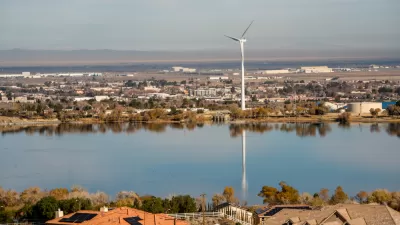The county of Los Angeles is looking for policy tools that will add affordable housing units to the housing market. Inclusionary zoning is its policy of choice.

"Housing developers seeking to build in many of Los Angeles County's unincorporated communities will soon be required to set aside units for low- and moderate-income renters," reports Steven Sharp.
With a few exceptions, the new ordinance requires rental housing projects with five or more baseline dwelling units (not including density bonus units) to include apartments for low- and extremely low-income households. "Developers will be offered three different set-aside options - ranging from 5 percent to 20 percent of the unit count - varying based on the affordability level and project site. Smaller-scale projects with 15 or fewer baseline units will be permitted to set aside fewer affordable units," according to Sharp.
The new ordinance also requires affordable units in for-sale projects: "Likewise, for-sale projects with five or more baseline dwelling units will be required to set aside homes for moderate- and middle-income households - a new category which roughly corresponds to 'workforce' housing."
Sharp's coverage of the new law includes more details on the where and how the law will be applied, and a process for evaluating the law's effectiveness in delivering the desired new affordable housing stock in unincorporated parts of L.A. County. Sharp also notes that the new inclusionary zoning ordinance furthers the county's work toward a suite of ordinances, requested by the Board of Supervisors in 2018, to spur production of affordable housing units in areas under its planning jurisdiction.
FULL STORY: L.A. County Supervisors Sign Off on Inclusionary Housing Policy

Maui's Vacation Rental Debate Turns Ugly
Verbal attacks, misinformation campaigns and fistfights plague a high-stakes debate to convert thousands of vacation rentals into long-term housing.

Planetizen Federal Action Tracker
A weekly monitor of how Trump’s orders and actions are impacting planners and planning in America.

In Urban Planning, AI Prompting Could be the New Design Thinking
Creativity has long been key to great urban design. What if we see AI as our new creative partner?

Pedestrian Deaths Drop, Remain Twice as High as in 2009
Fatalities declined by 4 percent in 2024, but the U.S. is still nowhere close to ‘Vision Zero.’

King County Supportive Housing Program Offers Hope for Unhoused Residents
The county is taking a ‘Housing First’ approach that prioritizes getting people into housing, then offering wraparound supportive services.

Researchers Use AI to Get Clearer Picture of US Housing
Analysts are using artificial intelligence to supercharge their research by allowing them to comb through data faster. Though these AI tools can be error prone, they save time and housing researchers are optimistic about the future.
Urban Design for Planners 1: Software Tools
This six-course series explores essential urban design concepts using open source software and equips planners with the tools they need to participate fully in the urban design process.
Planning for Universal Design
Learn the tools for implementing Universal Design in planning regulations.
planning NEXT
Appalachian Highlands Housing Partners
Mpact (founded as Rail~Volution)
City of Camden Redevelopment Agency
City of Astoria
City of Portland
City of Laramie





























